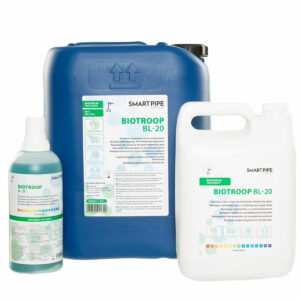The differences between bacterial technology and enzyme technology are particularly evident in wastewater treatment
New sewage pipes flow freely and are often not preventative for people. However, over time, organic matter slowly builds up on the inner surface of the pipe and blocks the flow of the wastewater. This is natural if the pipe is not cleaned regularly. Blockages cause odour problems and, in the worst case, flooding when the pipe fills with water. However, preventive plumbing (maintenance) prevents the most common blockages, those caused by organic waste, from occurring in the first place.
When a pipe clogs, most people’s approach is to unclog it with a liquid drain opener, the “household plumber”. These are available in almost all supermarkets. These drain openers usually contain either strong acids, strongly alkaline chemicals or enzymes.
How do commonly used enzymes work in drain openers?
The chemicals in a liquid drain opener react with the organic matter and dissolve it enough to allow the wastewater to flow again. But they do not prevent the blockage from recurring. Enzymes commonly used in sewer openers break down large molecules into smaller ones to drive them out of the pipe. In some cases, chemical manufacturers even go as far as marketing their products as “turboenzymes”, which is far from the truth. In reality, there are only simple enzymes. Enzymes speed up chemical reactions and when the reaction is over, the enzyme is released from its target.
Especially when it comes to the breakdown of fats, oils and grease (FOG) in sewers, it is a bad idea to use these market solutions, as they can only make the situation in the pipe worse. Enzymes do not break down waste. They simply wear out once they have completed their task – dissolving the molecule. Enzymes work like a knife and fork, chopping up the blockage causes into small pieces.
Next, we’ll explain why using bacteria to maintain plumbing is a better option than enzyme-based fluids.
What is the main difference between clogged drain openers and advanced bacteria-based maintenance products?
Our products to prevent plumbing blockages and other problems contain bacteria, which are living micro-organisms. Bacteria are functional as long as they can find food. People throw food suitable for bacteria into the pipes all the time.
Bacteria are very sensitive to pH, and the pH range 4-9 provides the best conditions for bacterial growth. Anything that strongly alters the pH of the pipe (such as a strongly alkaline pipe opener) will kill bacteria as effectively as a disinfectant. It is therefore important to understand where bacteria should or should not be used.
Under favourable conditions, bacteria can multiply up to every 15-20 minutes. This means that the total amount of bacteria in the tube can double in up to 20 minutes. So one bacterium can grow into a million bacteria in 8 hours. Only overnight can the bacteria you feed into the tube form a real bacterial colony. The unique growth reaction of the bacterium is the reason why our plumbing products are called
BioTroop®
.
Bacteria simply eat most of the organic matter in the pipe, especially the FOG waste. As the bacteria population grows, more and more waste is being consumed from the walls of pipes – in a completely sustainable way, without chemicals.
Positive effects of bacterial products on water treatment plants
From time to time, our customers wonder whether the use of bacterial products will have any negative impact on water treatment plants. Fermented bacterial cultures have been used for seeding and maintaining wastewater treatment plants since the 1940s. So the method we have used and developed is not new, but in its simplicity it is brilliant. Biological plumbing treatment products used by individual customers continue to break down organic waste as it enters the public sewerage system and on to water treatment plants. The benefits of a single customer are multiplied at the downstream end of the pipeline.
The most common type of bacteria we use is Bacillus. Fermented Bacillus cultures are very pure and do not contain any harmful micro-organisms. In fact, the BioTroop products we have developed make any water treatment plant more efficient. We only use QPS (Qualified Presumption of Safety) microbes, which are produced according to EFSA (European Food Safety Authority) standards. There is no need to worry about the compatibility or safety of our products for plumbing maintenance.
Find out more in our articles on the subject.

